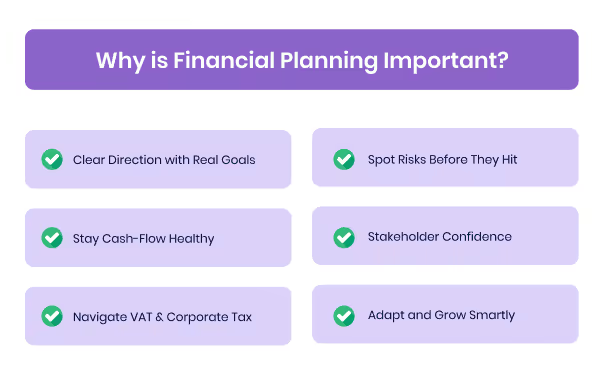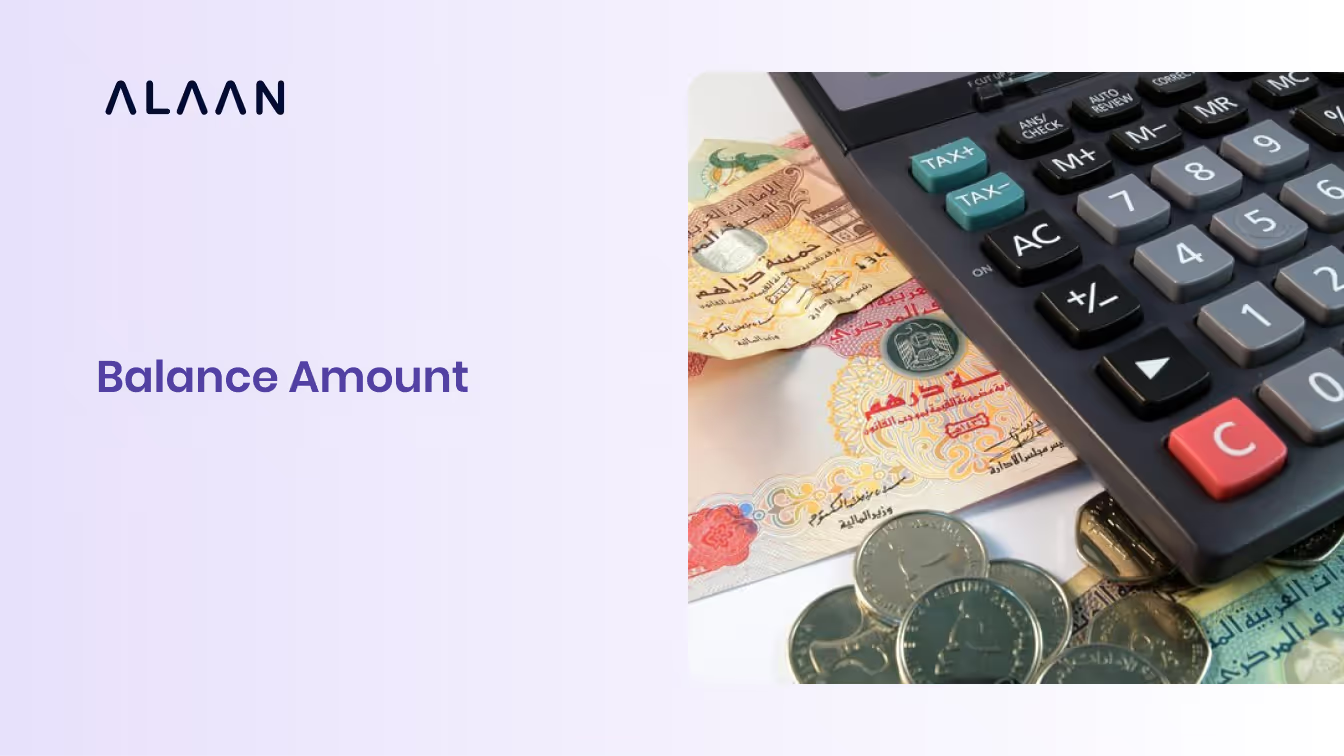Running a business in the UAE today is no walk in the park. With constantly shifting market conditions and hefty regulatory demands, many companies struggle with one thing in common: a lack of a solid financial plan.
Did you know that over half of CFOs (58%) have ramped up their focus on financial planning and analysis this year? That's because without a clear plan, cash flow surprises and compliance issues can quickly derail even the best ideas.
This guide will break down what a financial plan really means for your business, why it’s a game-changer in 2025, and exactly how to build one that fits the UAE’s unique challenges and opportunities.
Key Takeaways:
- Set SMART financial goals aligned to your business priorities for focused growth and clarity.
- Assess your financial position thoroughly, review income, expenses, assets, and liabilities, to plan realistically.
- Build a detailed budget, including operational and compliance costs like VAT and corporate tax, for cash flow control.
- Identify risks, prepare contingency plans, and regularly update your financial plan to stay agile in the UAE market.
What is a Financial Plan?
A financial plan is essentially your business's money roadmap. It outlines where your company wants to go financially and the steps you'll take to get there. Think of it as a detailed projection of your income, expenses, investments, and cash flow—all designed to help you make smarter decisions day to day and long term.
In the UAE, a financial plan doesn't just cover budgeting. It also takes into account regulatory requirements like VAT and corporate tax compliance, helping you stay legal and audit-ready. Plus, it includes risk management strategies to prepare you for market shifts or unexpected costs.
In short, it’s all about creating a proactive framework that keeps your business financially healthy and ready to grow.
Why is Financial Planning Important?

Financial planning is fundamental to your business's survival and success. Without a solid plan, businesses can quickly fall prey to cash flow gaps, compliance penalties, or missed opportunities for growth.
Here’s why it matters so much in 2025, UAE:
- Clear Direction with Real Goals: Financial planning lets you set measurable targets, so you know exactly where your business is headed instead of just hoping for growth.
- Stay Cash-Flow Healthy: Proper forecasting helps avoid nasty surprises, ensuring you have enough working capital to cover daily operations and unexpected expenses.
- Navigate VAT and Corporate Tax: With the UAE’s evolving tax landscape, a good financial plan integrates compliance seamlessly, so you’re never caught off guard by new rules or audits.
- Spot Risks Before They Hit: Planning allows you to prepare for market dips, cost hikes, or sudden changes in demand, protecting your bottom line and reputation.
- Build Investor and Stakeholder Confidence: Transparent, data-backed financial plans make it easier to secure funding and partnerships, proving you know your numbers and risks.
- Adapt and Grow Smartly: The business environment shifts quickly; your financial plan helps you adapt your strategies and investments based on the latest market and economic trends.
Top Steps to Creating a Financial Plan

1. Decide What Success Looks Like
Setting clear, specific financial goals provides your business with a focused target. Without measurable objectives, it’s easy to lose direction or allocate resources ineffectively.
- Using the SMART framework, your goals should be Specific, Measurable, Achievable, Relevant, and Time-bound.
- Align financial goals with key business priorities like market expansion, digitisation, or customer retention.
For example, you might aim to increase monthly sales by 40% within the next 12 months or reduce operational costs by 15% to boost profitability by the end of the quarter.
Having clear, well-defined goals helps streamline decision-making and focus resources where they matter most.
2. Take Stock of Your Current Financial Health
Before planning for the future, you need a clear understanding of where your business stands today. Knowing your current financial health provides the foundation for realistic and effective decision-making.
- Review your key financial statements, like cash flow, profit and loss, and balance sheets.
- Identify your available cash reserves, short-term liabilities, and recurring expenses to map out your operating capacity.
- Assess financial ratios like liquidity and profitability to understand strengths and vulnerabilities.
A thorough assessment helps you tailor your financial plan to local realities and anticipate cash flow needs effectively.
Knowing where you stand today enables smarter forecasting and helps avoid overcommitting resources or missing growth opportunities.
3. Create a Budget Aligned to Your Strategy
A budget is the backbone of your financial plan, it tells you where the money should go and helps ensure you don't overspend.
- Start by aligning your budget with your financial goals and business priorities. If growth is the focus, allocate more resources to marketing, technology, or talent acquisition.
- For UAE businesses, remember to budget for compliance costs such as VAT filings, accounting software, and any advisory fees to stay ahead of legal requirements.
- Use past data and realistic projections to set spending limits on different departments or projects.
A well-planned budget helps you control costs, manage cash flow smoothly, and make data-driven decisions. Without it, even profitable companies can run into trouble due to poor cash management.
4. Look Beyond the Short Term
Financial planning is also about forecasting where your business will be in the next 12 to 24 months.
- Use historical sales data, economic trends, and customer insights to project cash flow and revenue growth.
- Anticipate potential funding gaps or seasonal fluctuations in the UAE market to avoid surprises.
- Consider upcoming changes such as regulatory updates or planned expansions and factor in their financial impact.
Long-term forecasting helps you prepare for challenges before they arise and capitalise on growth opportunities with confidence.
5. Identify Risks and Have a Contingency Plan
Every business faces risks, and the UAE’s dynamic market is no exception. Recognising and planning for potential disruptions protects your financial stability.
- Identify key risks specific to your business and region, such as supply chain delays, regulatory changes (like VAT adjustments), or sudden market shifts.
- Develop contingency strategies, such as maintaining an emergency cash reserve or flexible supplier agreements, to quickly respond to challenges.
- Regularly update your risk assessment to reflect new threats or opportunities.
By proactively managing risks, you minimise the impact of unexpected events on your cash flow and operations, helping your business stay resilient and compliant
6. Integrate Tax and Regulatory Compliance
The UAE's tax landscape has evolved quickly, and your financial plan must reflect these changes to keep your business safe and efficient.
- Factor in UAE corporate tax rules and VAT requirements directly into your budgeting and forecasting.
- Stay updated on registration thresholds, filing deadlines, and documentation standards to avoid penalties.
- Consider investing in software and advisory services that automate compliance and generate audit-ready reports.
Integrating compliance reduces risks, saves time on manual processes, and provides peace of mind, allowing you to focus on growing your business confidently in the UAE’s rigorous regulatory environment.
Also Read: UAE Corporate Tax: A Comprehensive Guide For Businesses
7. Regularly Review and Adjust Your Plan
A financial plan is a living document, not a “set it and forget it” checklist. Regular reviews ensure you stay aligned with your business goals and market realities.
- Schedule quarterly reviews to compare actual performance against your forecasts and budgets.
- Adjust your financial projections based on new data, market changes, or unexpected expenses.
- Use these reviews to identify areas needing cost controls or growth investment, keeping your plan relevant.
Consistent monitoring empowers you to make data-driven decisions and maintain financial health amid change.
8. Leverage Technology and Expertise
Modern financial planning is powered by the right tools and expert advice, especially in the UAE’s complex business environment.
- Use accounting software and AI-driven forecasting tools to boost accuracy and reduce manual errors.
- Adopt spend management platforms and corporate cards to gain real-time visibility into expenses, automate receipt matching, and ensure VAT compliance seamlessly.
- Choose cloud-based platforms that integrate expense management, tax reporting, and real-time financial data syncing.
- Partner with UAE-based financial advisors who understand local regulations and can help you tailor your financial plan for maximum impact.
Integrating tech and expertise with your financial plan saves time, reduces errors, and gives you greater control.
Must Read: Future of Finance Automation in Detail
How Alaan Helps Make Financial Planning Easier
Managing finances in the UAE’s business environment can be complex. That’s where Alaan steps in to simplify your financial planning and expense management.
How we help:
- Corporate Cards: Our corporate cards give your team real-time access to funds while you maintain full control through spending limits and instant approvals.
- Real-Time Spend Visibility: See all your business expenses in one dashboard, so you can track budgets and prevent overspending before it happens.
- Automated VAT Compliance: We automate receipt capture and VAT calculations, reducing errors and saving you valuable time during tax season.
- Smart Budget Controls: Set customizable spending rules and approval workflows that align perfectly with your financial plan and company policies.
- Seamless Integrations: Our platform syncs smoothly with your existing accounting and ERP systems, making monthly reconciliations and financial reporting painless.
Conclusion
Financial planning is the foundation for business resilience and growth in the UAE’s dynamic market. A robust financial plan helps you manage cash flow efficiently, stay compliant with evolving tax regulations, mitigate risks, and make smarter, data-driven decisions.
However, effective planning demands accurate, real-time data and streamlined processes. This is where Alaan comes in. Our platform empowers you to build and maintain financial plans that truly work, turning complexity into clarity.
Taking control of your finances today sets you up for sustainable success tomorrow.
Let Alaan be your partner in simplifying financial management and accelerating growth.
FAQs
Q. How can a financial plan help businesses in the UAE manage unexpected costs?
A well-prepared financial plan includes risk assessments and contingency strategies that help businesses anticipate and buffer against unexpected expenses such as regulatory changes, supply chain disruptions, or market fluctuations unique to the UAE.
Q. What role does financial planning play in securing funding for UAE startups and SMEs?
Financial planning demonstrates to investors and lenders that the business understands its cash flow, costs, and growth trajectory, making it easier to secure financing in the UAE’s competitive market.
Q. How does financial planning support VAT and corporate tax filings apart from compliance?
Beyond compliance, financial planning helps schedule cash flows to ensure timely tax payments, avoid penalties, and optimise tax liabilities through strategic budgeting and expense management.
Q. What should UAE businesses prioritize when updating their financial plans during economic shifts?
During economic shifts, businesses should focus on stress-testing cash flow projections, revamping budgets to preserve liquidity, and recalibrating growth goals based on market realities.
Q. How do financial plans complement other business strategies like digital transformation or market expansion in the UAE?
Financial plans allocate resources and forecast returns, ensuring investments in digital tools or new markets are financially sustainable and aligned with overall business objectives.


.avif)






